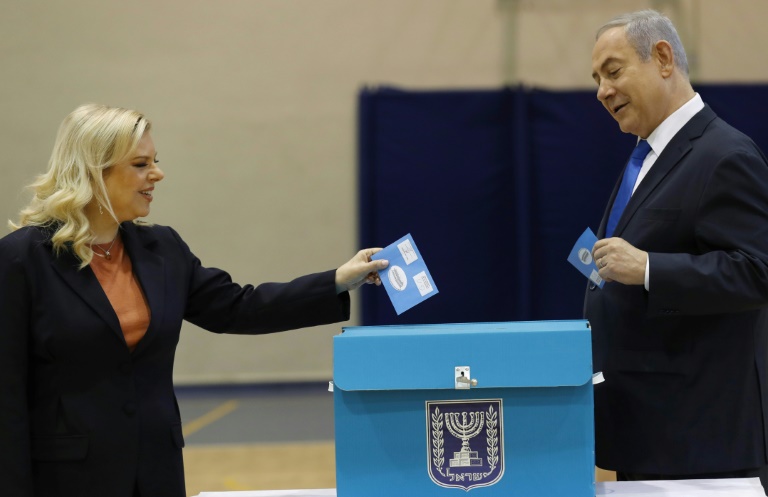
Israeli Prime Minister Benjamin Netanyahu voted with his wife Sara, urging people to go to the polls despite coronavirus fears. (Photo: AFP)
Israel held its third election in less than a year Monday seeking to break a political deadlock, with Prime Minister Benjamin Netanyahu chasing re-election while facing criminal indictment.
Turnout appeared high despite what President Reuvin Rivlin called an "awful and grubby" campaign characterised by mudslinging between Netanyahu's right-wing Likud and his main challengers, the centrist Blue and White.
Polls were due to close at 10 pm local time (2000 GMT) with exit polls to be released immediately afterwards but initial results only expected Tuesday morning.
Voicing the feelings of many ballot-weary Israelis after nearly a year of political stalemate and a caretaker government, Rivlin said the Jewish state does not "deserve this never-ending instability".
Election day is "normally a festive day," he added. "But the truth is that I don't feel like celebrating. I only (feel) a sense of deep shame."
The vote comes just two weeks before Netanyahu, the longest-serving premier in Israeli history, stands trial after being formally charged in January with bribery, fraud and breach of trust.
While many have predicted further deadlock, Netanyahu hoped to benefit from his tough position on the Palestinians and on Jewish settlements.
In January, US President Donald Trump unveiled his controversial peace plan greenlighting Israel's annexation of settlements and swathes of land in the occupied West Bank, sparking Palestinian outrage.
Bolstered by US support, Netanyahu has campaigned on building thousands more homes in Jewish settlements in the territory, even though they are considered illegal by the international community.
Blue and White leader Benny Gantz, a former army chief and security hawk, has also welcomed the Trump proposals.
'Kick out Netanyahu'
Final polls suggested Netanyahu, the first Israeli prime minister ever indicted in office, had not lost support since inconclusive elections in April and September.
Gantz, voting in the central town of Rosh Haayin, voiced hope that Israelis would finally "change the tune" after 11 years of the Netanyahu tenure.
But both big parties were expected to fall well short of the 61 seats needed for a majority in Israel's parliament, the Knesset, and will have to strike deals with smaller parties to forge a stable coalition.
That proved impossible after the last two votes and polls indicated a third stalemate in the divided country of 6.4 million eligible voters.
Political leaders are keen to avoid a fourth vote given the damage done by the impasse, as the caretaker government's inability to pass a budget has left key social programmes unfunded.
Netanyahu supporter Ella Levy told AFP that Israel was "flourishing" under the premier's leadership.
"For me, he is innocent until they prove otherwise," she said at a polling station in Jerusalem.
The 70-year-old premier, who will face trial from March 17, faces accusations including receiving improper gifts worth thousands of dollars and offering a media mogul lucrative regulatory changes in exchange for favourable coverage.
Gantz, meanwhile, has been accused of saying little about his vision for Israel, defining himself primarily as Netanyahu's clean rival.
Blue and White supporter Assaf Yalovsky, 48, said while Gantz was not the "greatest politician" he was a "good man, an honest man".
"This country didn't have quiet day-to-day life for the last year," he said of the political turmoil.
"We are on a mission to kick out Netanyahu."
Coronavirus fears
Facing static polls, parties focused their attention on boosting turnout among their supporters.
The election is being held amid the coronavirus epidemic, with 10 cases so far confirmed in the Jewish state and another 5,600 Israelis under self-quarantine, many of whom visited countries where the virus is prevalent.
At 16 special polling stations those under quarantine were greeted by election staff in full protective suits and masks.
Voters had to wash their hands and wear gloves before getting to cast their ballots, presenting their ID cards to election officials separated by plastic sheets.
"The coronavirus thing is completely under control," Netanyahu said after voting in Jerusalem. "People can vote with complete confidence."
Initial results suggested turnout could be high, despite the repeat election.
Official statistics showed that as of 4 pm local time (1400 GMT), the voting rate stood at 47 percent, up from 44 percent in September at the same time.
If that trend continued it would be the highest turnout since 1999.
Ofer Zalzberg, an Israeli analyst at the International Crisis Group think-tank, predicted the final results would look similar to those in September.
"The most likely result is we wake up Tuesday morning still stuck without a clear winner," he told AFP.


